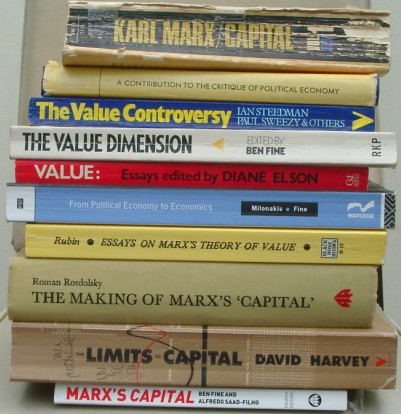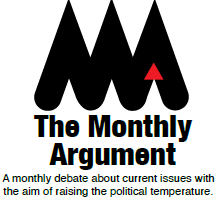The next Melbourne “Monthly Argument” debate is today (September 9, 2010). Apologies for the late notice! Full details below (you will need to scroll down!)
The debate topic is: “Renewable Energy: should we make the switch?”
It won’t be a debate about climate change (whether it’s happening), but about what should be done about it. In this context, it’s worth taking a look at a recent post at Skeptic Lawyer : Climate change, scepticism and elitism (also read the comments) and perhaps drop over to Larvatas Prodeo to read Robert Merkel’s extraordinary reaction to it: The Intellectual laziness of climate skepticism.
I really want to write more about this, but it’s too late at night now. Suffice it to say that the post at Skeptic Lawyer (which was written by Legal Eagle) was not in fact an attempt to make a case against the scientific argument for climate change. It was much more about the anxiety associated with not wanting to just go along with the majority voices on the matter, the pressure to conform, and the concerns of the author that any rapid attempt to slash carbon emissions will hit the poorer sections of society very hard. It was a long and thoughtful post – but it hit a raw nerve among the LP people. I think it was remarks like this which did it:
Further, ordinary people should not be criticised for being sceptical. If you are asking people to change the way in which they live fundamentally, in ways that could impact them greatly, you should not ask them to be unquestioning. There is a real arrogance on the part of the likes of Hamilton and Monbiot which makes me recoil from their agenda.
******
One of the participants in the Insight program made an interesting observation to me beforehand. He said, “I’ve noticed that scepticism tends to be class-based. Middle-class, university educated people are far more likely to accept that climate change is happening. Working-class people are far more likely to be sceptical and concerned.” There is a deep elitism at the heart of the writings of some who suggest the shape of the policy responding to climate change (eg, Clive Hamilton, George Monbiot). The sly inference is that working-class people are stupid bogans who don’t know any better, and that they should let their betters guide them in what is to be done.
********
When an issue gets politicised like that I get very worried. I must confess that I don’t really understand why the Left has decided that it will swallow climate change policy whole (which is distinguishable from the question of science). I know that one of the ideas of climate change policy is the idea that we should consume less and be a less capitalist society (which clearly fits into many leftist ideas). But surely another concern of left-wing people should be the perpetuation of the class system and the deepening of the divide between rich and poor. To me, it seems that anyone who is left-wing or progressive should also be concerned about potential effects of some suggested climate change policies on less privileged members of society, and that they should be concerned about the possibility of an elitist society if we institute the suggestions of commentators such as Clive Hamilton or George Monbiot. If we implement any policy, I believe we have to be really careful that it doesn’t create a more unequal society.
*************
One of the audience members of the Insight program said her worry was that climate change science is being used by some to stifle development in poor countries so that they are kept “carbon neutral”. It’s a form of elitism, perhaps even an environmental neo-colonialism – “We know what’s best for you poor brown people, you have to stay in mud huts because it is a carbon neutral way of existence.” It buys into the whole myth of the “Noble Savage“. That’s not a fault of climate change scientists, as Professor Schneider pointed out in response.
Some sceptics are concerned about the way in which science is being used to push various political barrows in ways that might disadvantage those who are less economically secure or vulnerable. That is a progressive concern.
Further, ordinary people should not be criticised for being sceptical. If you are asking people to change the way in which they live fundamentally, in ways that could impact them greatly, you should not ask them to be unquestioning. There is a real arrogance on the part of the likes of Hamilton and Monbiot which makes me recoil from their agenda.
One of the participants in the Insight program made an interesting observation to me beforehand. He said, “I’ve noticed that scepticism tends to be class-based. Middle-class, university educated people are far more likely to accept that climate change is happening. Working-class people are far more likely to be sceptical and concerned.” There is a deep elitism at the heart of the writings of some who suggest the shape of the policy responding to climate change (eg, Clive Hamilton, George Monbiot). The sly inference is that working-class people are stupid bogans who don’t know any better, and that they should let their betters guide them in what is to be done.
When an issue gets politicised like that I get very worried. I must confess that I don’t really understand why the Left has decided that it will swallow climate change policy whole (which is distinguishable from the question of science). I know that one of the ideas of climate change policy is the idea that we should consume less and be a less capitalist society (which clearly fits into many leftist ideas). But surely another concern of left-wing people should be the perpetuation of the class system and the deepening of the divide between rich and poor. To me, it seems that anyone who is left-wing or progressive should also be concerned about potential effects of some suggested climate change policies on less privileged members of society, and that they should be concerned about the possibility of an elitist society if we institute the suggestions of commentators such as Clive Hamilton or George Monbiot. If we implement any policy, I believe we have to be really careful that it doesn’t create a more unequal society.
One of the audience members of the Insight program said her worry was that climate change science is being used by some to stifle development in poor countries so that they are kept “carbon neutral”. It’s a form of elitism, perhaps even an environmental neo-colonialism – “We know what’s best for you poor brown people, you have to stay in mud huts because it is a carbon neutral way of existence.” It buys into the whole myth of the “Noble Savage“. That’s not a fault of climate change scientists, as Professor Schneider pointed out in response.
Some sceptics are concerned about the way in which science is being used to push various political barrows in ways that might disadvantage those who are less economically secure or vulnerable. That is a progressive concern.
*****************
Tonight’s Monthly Argument will be around the issue of the cost of slashing carbon emissions by attempting to move to renewables in the near future. The fact is that you can “believe in” climate change (ie accept that there seems scientific to be evidence of AGW ) , without also believing that the best thing to do is to take measure to reduce carbon emissions right now. The latter belief does not automatically follow from the former. But this has been obscured by all the shouting about “deniers” and also by the underlying ideological stance of that section of the green movement which is anti-development, and sees humanity as needing to atone for its hubris in thinking it could conquer nature.
( btw Sceptic Lawyer also has a post about today’s “The Monthly Argument” which ties it in with the attack on Legal Eagle by Robert Merkel: The Monthly Argument strikes again)
Copy of mail-out from “The Monthly Argument”
Announcing our September Debate!
Renewable Energy: should we make the switch?
Thursday September 9, 6:30 pm for a 7pm start. Dan O’Connel Hotel, 225 Canning Street, Carlton.
(http://themonthlyargument.wordpress.com/ )
Have a look at our speaker line up!
Lead speakers:
John Daley (from the Grattan Institute) (“yes, we should switch”)
versus
Alan Moran (from the Institute of Public Affairs) (“no, we shouldn’t switch”)
Battle of the think-tanks predicted! It should be fun!
Panellists:
Arthur Dent (aka Albert Langer)
Matthew Wright (Beyond Zero Emissions)
Austin Williams (Director of the Future Cities Project, (UK) )
Cam Walker (Friends of the Earth)
On this topic it would be difficult to put together a better line up (we can’t resist a bit of a boast!)
It should be a great evening. The debate begins at 7pm sharp and will conclude at around 8:15pm. There will be an opportunity during the debate itself for questions from the floor, and afterwards it will be possible to stay on to socialise and continue the argument informally with members of the audience, and with at least some of the speakers.
The aim of the Monthly Argument is to promote political liveliness, lift the level, raise the temperature and create something very different from both the “ABC conversation” events, and from the repetitive discussions which occur within the various political tribes
We’re attempting to bring back something of the spirit of the ’60’s “Teach-Ins”.
Hope to see you there.
Time and location details:
Date: Thursday September 9
Time: 6.30 for 7.00pm. The debate will end around 8.15pm.
Venue: The Function Room of the Dan O’Connell Hotel 225 Canning Street (cnr Princes St) Carlton (Melway 2B J4).
Free admission. No need to book.
The Monthly Argument – raising the political temperature
(Second Thursday of the month at the Dan O’Connell)
0488 532 559
http://themonthlyargument.wordpress.com





Recent Comments